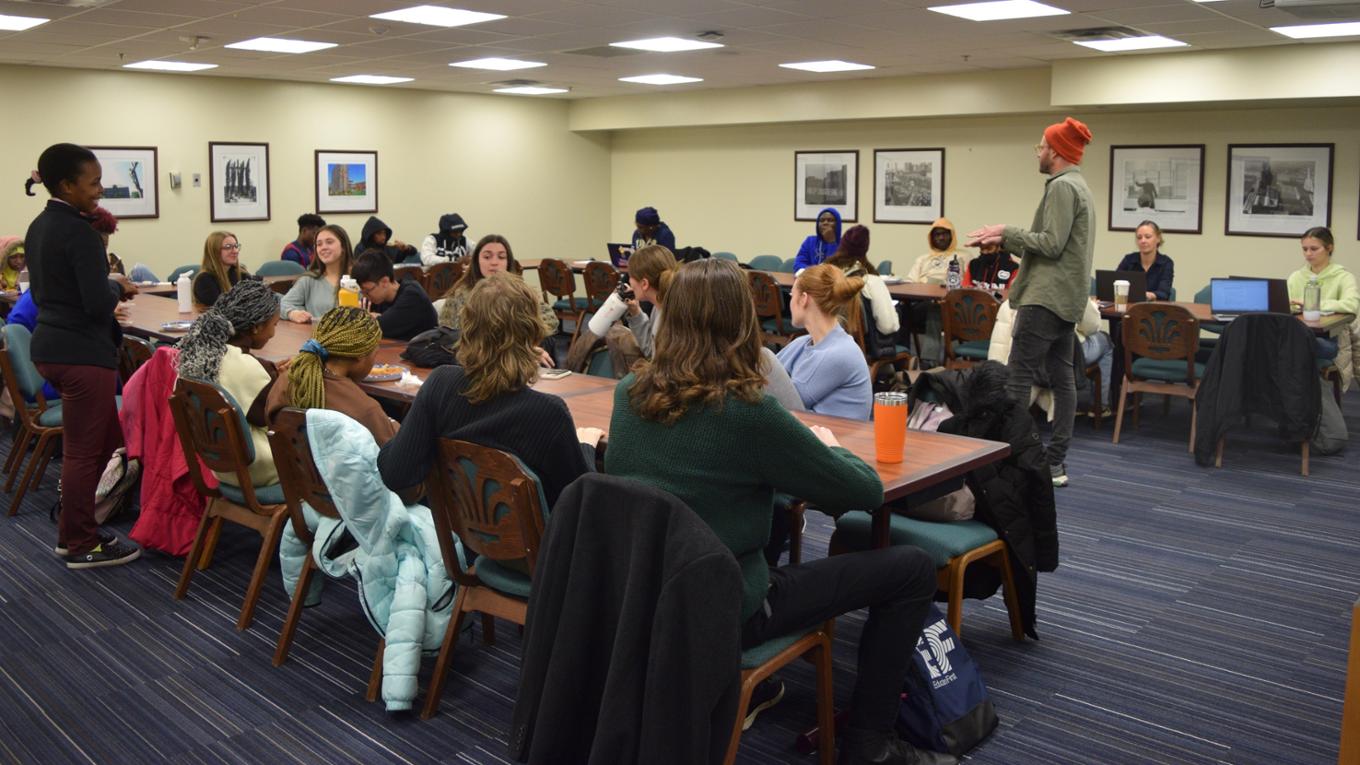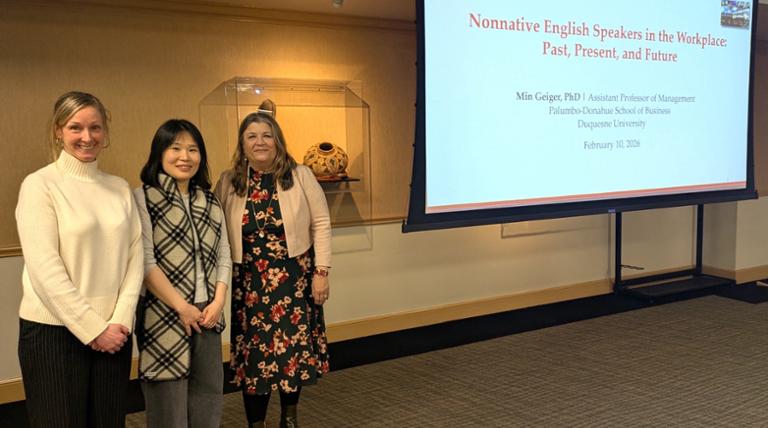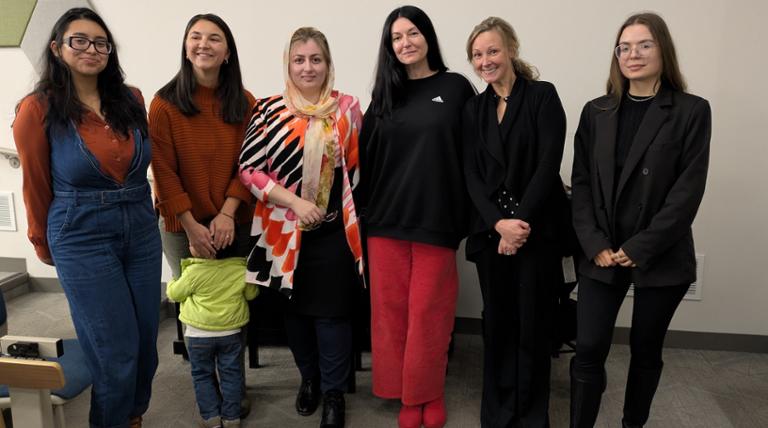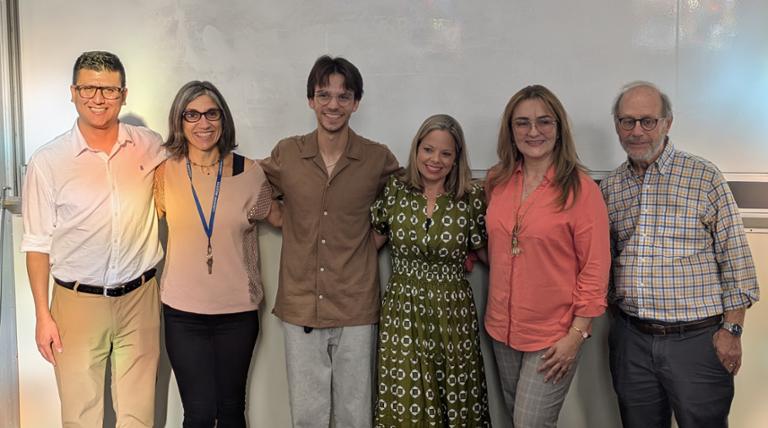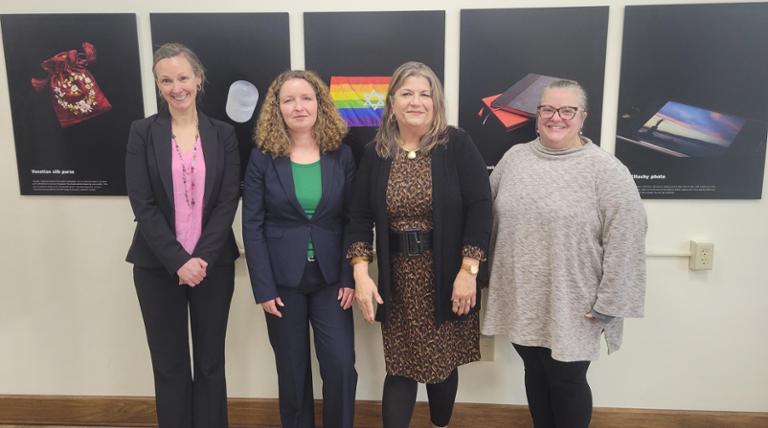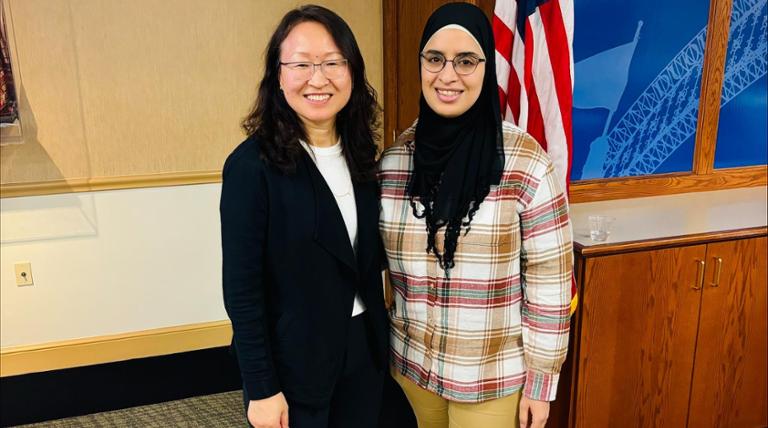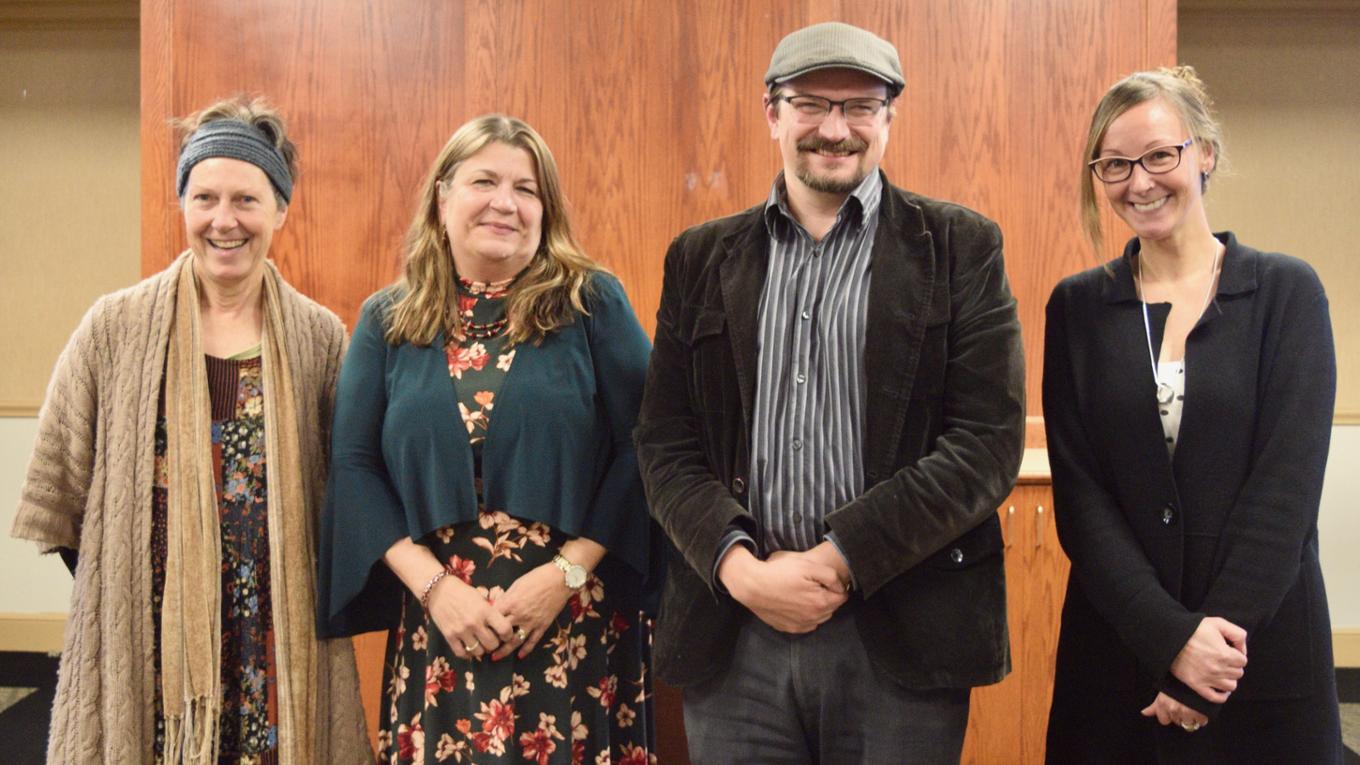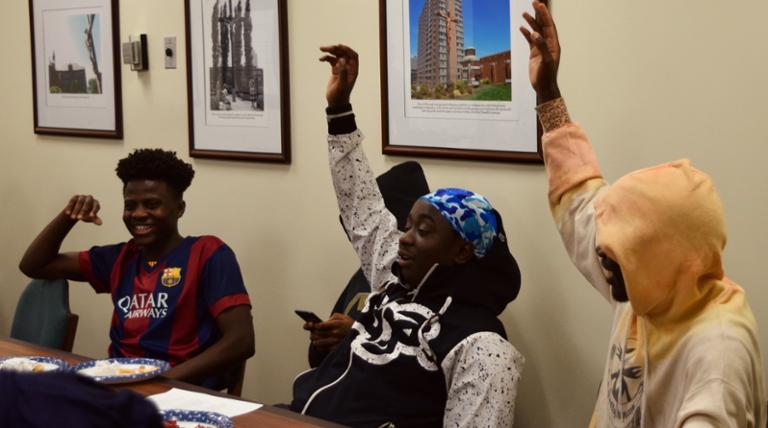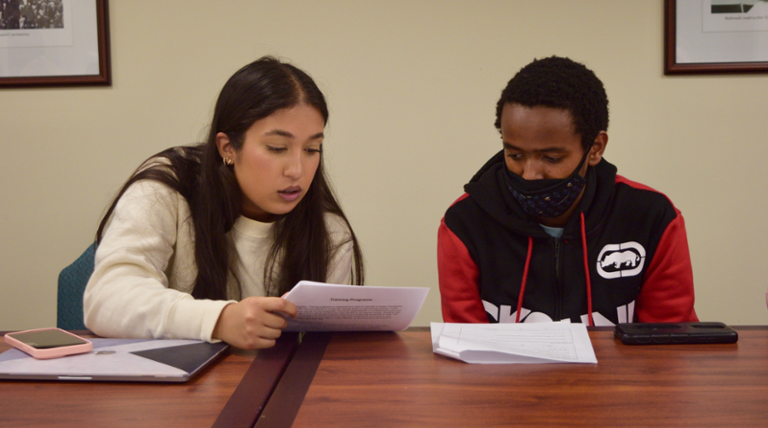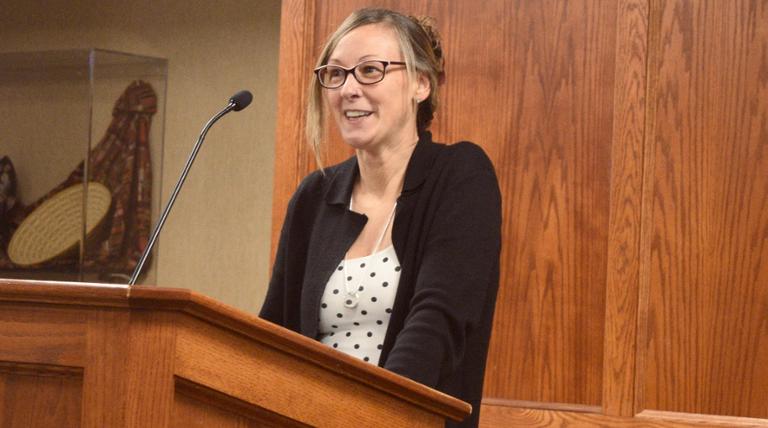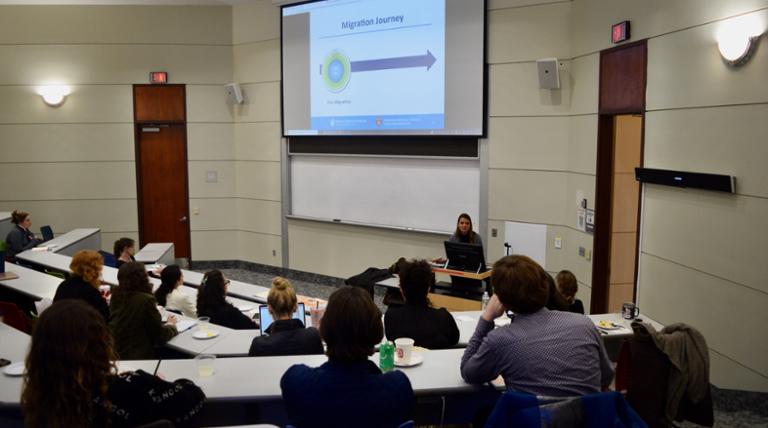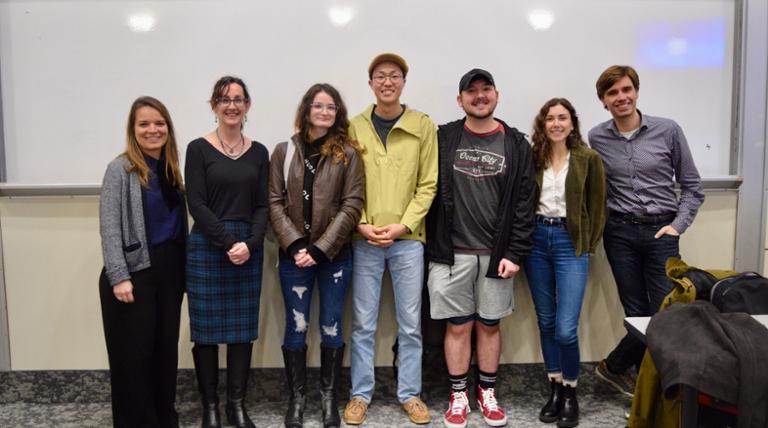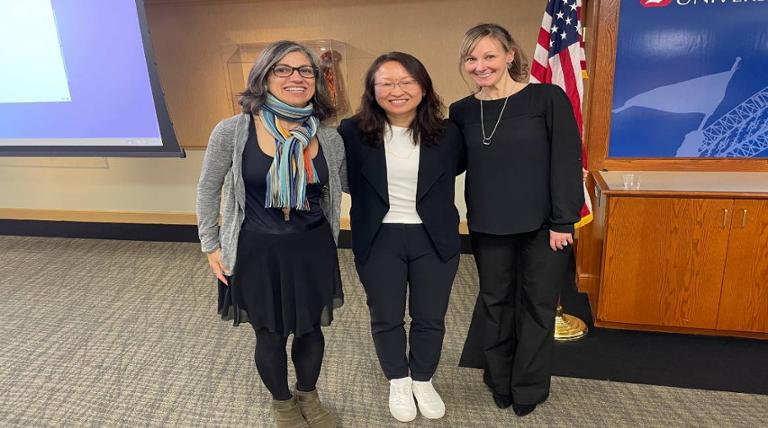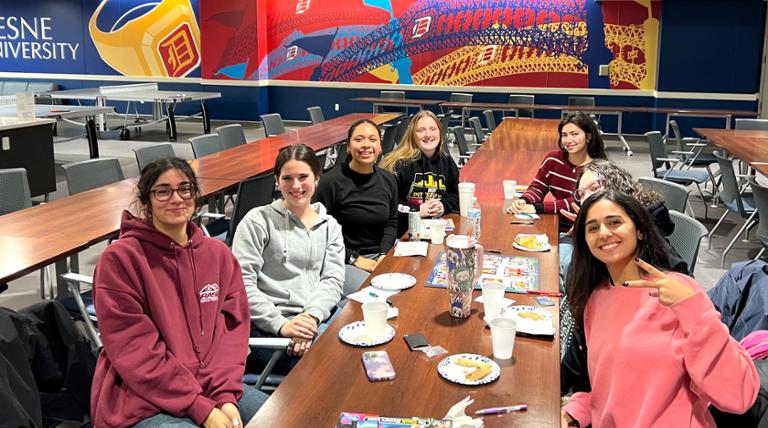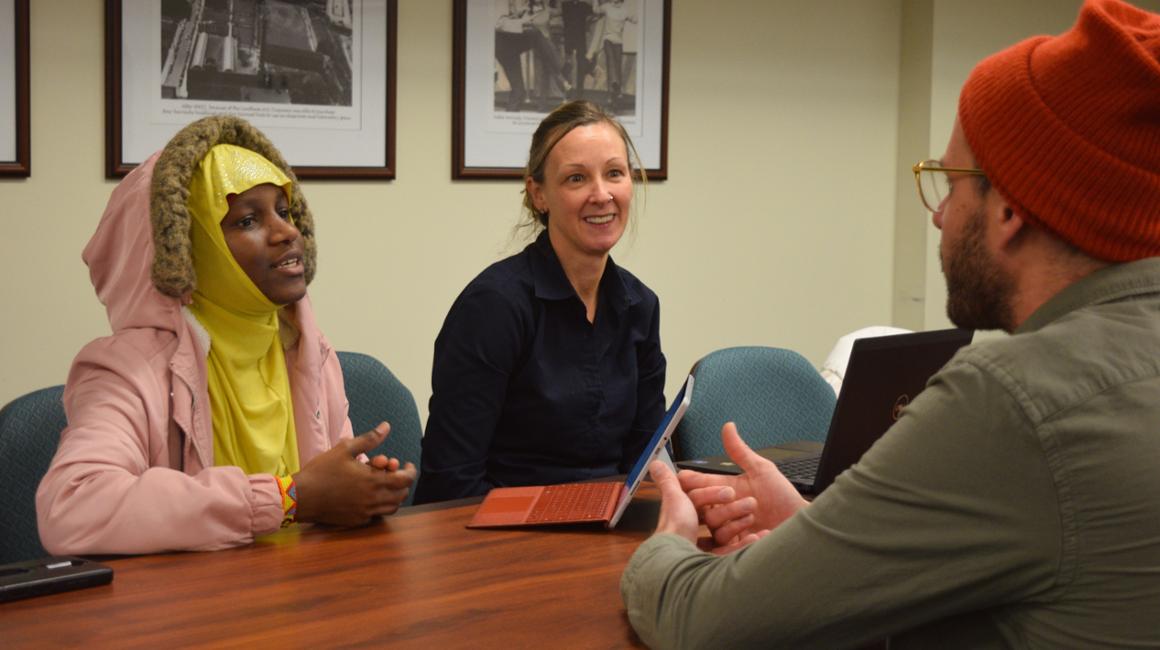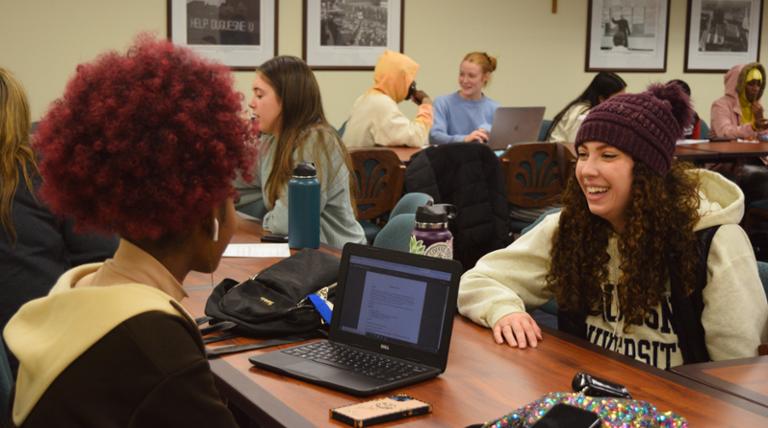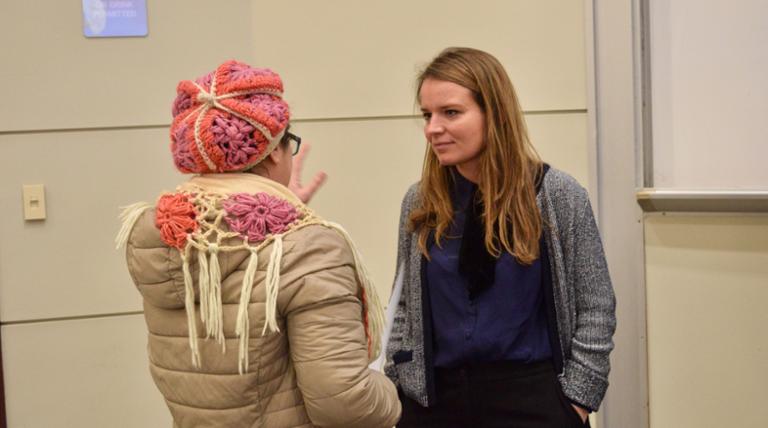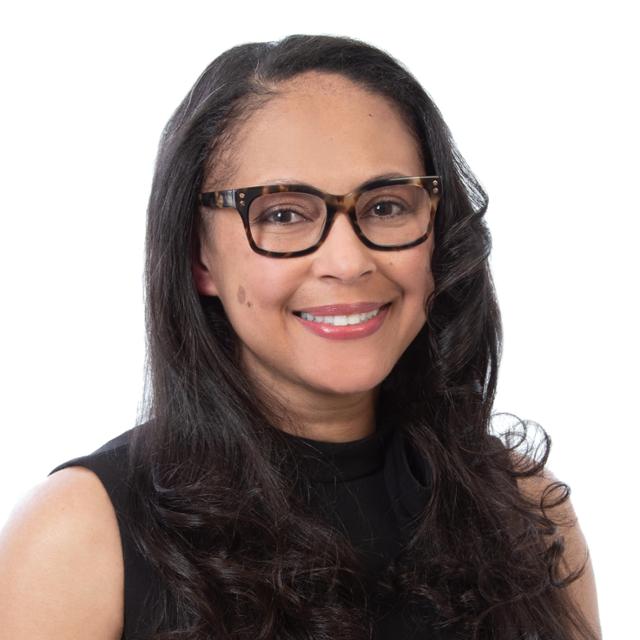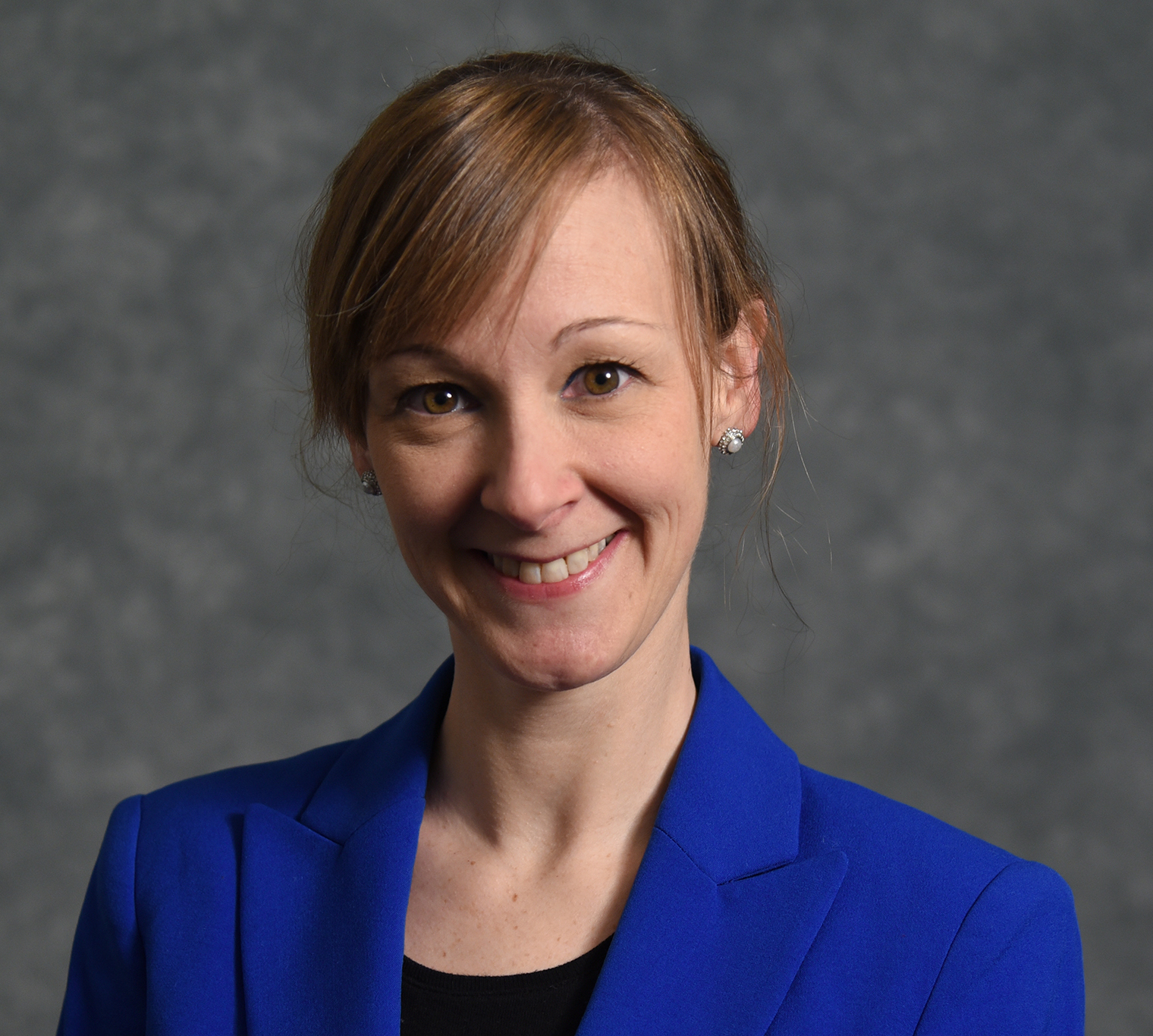Working Alongside Our Neighbors
The Center for Migration, Displacement and Community Studies engages you with critical issues of social justice related to human flows at the local, national, and international levels.
Center-affiliated faculty work alongside you and community partners to promote scholarship, teaching, and community engagement in the field of Migration Studies across a wide range of disciplines.
Become service-orientated through community engagement opportunities. Work with the Center's long-term partnerships that provide support to local refugee and migrant service organizations and the communities that they serve in the Pittsburgh region.
Donate: McAnulty Keating Pantry
Please donate what you can to help keep the McAnulty Keating Pantry going!
About the Center
Migration is a Universal Concern
Migration is a global phenomenon of significant magnitude, and we are currently living in a time of unprecedented human displacement.
Migration Studies encompasses the forced or voluntary movement of persons from one place to another. In the present age, transnational migration sparks controversy, giving rise to numerous xenophobic movements in the United States and in many European countries, along with political instability and violence around the world.
In response to the serious social, economic, and political consequences of migration and displacement, the Center supports research geared toward understanding these consequences. The Center is also concerned with how to support service organizations and migrant communities in the Greater Pittsburgh area.
CMDCS Mission
The mission of the Center is to foster scholarly inquiry and collaboration among Duquesne faculty, students, and community partners in order to:
- Advance scholarly understandings of migration, displacement, and the integration of migrants into their communities and the impact of current political developments or crises on those communities.
- Support scholarly research and publication in the areas of migration, displacement, and immigrant integration.
- Influence public attitudes toward migrant populations in the spirit of Catholic teaching.
- Encourage partnership and collaboration between faculty, students, and community partners who work with migrant populations.
- Uphold the human dignity and well-being of migrants.
CMDCS Research & Faculty
Collaborate on research with fellow students, faculty, and community partners. Apply to our yearly research awards and contribute to work in Migration Studies. The Center and its faculty members support your research through awards, presentations, events, and mentorship.
Join the Migration Club . The Club initiates humanitarian outreach to our local community, and raises awareness on campus on various issues related to migration, displacement, and community building.
Research Awards
Apply to the Center's annual awards for faculty, undergraduate, and graduate students.
Research Support
- Hosting of Brown Bag lunches among faculty and students to discuss research projects in the area of migration, displacement and community studies
- Sponsorship of annual awards for faculty, undergraduate and graduate students
- Sponsorship of conference attendance for the presentation of research related to Migration Studies
- Hosting of an annual research symposium with an invited external guest speaker - Duquesne students and faculty serve as panelists
- Providing Research Assistantships to interested students for course credits
- Providing access to Community-engaged course opportunities
The Center at Work
Events sponsored and co-sponsored by the Center
Community Engagement Opportunities
Community Partners
The Center coordinates engagement and research opportunities between students, faculty, and community partners.
- The After School Club aims to help immigrant and refugee high school students overcome educational and social barriers that hinder successful integration.
- The After School Club generates hands-on learning experiences for students about the challenges facing refugee communities. Duquesne students also gain research experience by designing and collecting assessment information.
- The program takes place on Duquesne University's campus and is a collaboration with partner agencies to engage students in activities focused on academic success, college and career readiness, celebration of culture and identity, and civic engagement.
- The program encourages social and cultural integration through near-peer mentoring by local university students and field trips.
- The After School Club was founded by ARYSE -- Pittsburgh's premier resource for immigrant and refugee youth.
Contact Dr. Jennie Schulze to get involved.Join the After School Club
- JFCS Refugee & Immigrant Services has worked with thousands of individuals and families over the years, helping them create new lives in our community after escaping unimaginable circumstances.
- From resettling newly-arriving refugees to connecting people with critical resources for acclimating to live in our country, JFCS is present through every step of their journey.
- Reading to Play, Playing to Read is a community-engaged project that combines the learning goals of two Spanish courses: MLSP 302W-CE Composition and Conversation and MLSP 280 Spanish for Health Professionals.
- Students from both courses collaborate to develop a 4-week program on health awareness and illness prevention culture for 5-8 year-old Hispanic children, who recently immigrated to the US.
- The Rita M. McGinley Psychology Clinic is the primary training facility for doctoral students in clinical psychology.
- The Clinic's mission is to provide supervised training experience for doctoral students, while offering affordable, professional clinical services to the Duquesne community and the general public.
- The Clinic provides individual, couples, family, and group psychotherapy as well as psychological assessment.
- Open Field helps immigrant youth through the love of soccer.
- The mission is to improve the lives and futures of youth through sport.
- Open Field's sport-based programming creates a safe space for youth to play and learn, with an educational topic connected to every practice and game.
- Youth participants take on leadership roles as coaches, referees, and mentors to their peers.
To get involved, contact Chloe Kinnahan or Justin Foranzo.Discover Open Field
Research Opportunities
Brown Bags
Research related to the mission of the Center can gain support via the Center's Brown Bag Lunches. A Brown Bag Lunch is a causal setting where student researchers can share their projects for feedback and advice from professors who work in related topics.
Reach%20out%20to%20us with a brief explanation of your current research or research interests, and any professors you would particularly like to work with, and we can organize a Brown Bag lunch for your research interests.
URSS
Submit to the 2023 Undergraduate Research and Scholarship Symposium
Past Winners
2024
Outstanding Research Award
Pedagogy to Practice: Addressing the Differential Needs of At-Risk Gen-Z Students in Secondary and Post-Secondary Education
Fatima Demlak & Maria Ortiz
2023
Outstanding Research Award
Against All Odds: Psychosocial Interventions for Homeless Youth
Hannah Davis, Sarah Foster, & Lauren Rose
Honorable Mention
Integrating Data to Recognize Community Need Across Pennsylvania
Valerie Koester
2022
Outstanding Research Award
No Human is Illegal: The study of Anti-Homeless and Hostile Architecture
Jason Minicozzi
Political Science, Sociology, Philosophy | McAnulty College and Graduate School of
Liberal Arts | Sophomore
Faculty Advisor: Kathleen Roberts, Ph.D.
Honorable Mention
Reevaluating the causes of Destruction of the Lower Hill
Avishek Acharya
History / Political Science | McAnulty College and Graduate School of Liberal Arts
| Senior
Faculty Advisor: Jennifer Tayler, Ph.D
The Misrepresentation of Native Americans in Textbooks in the United States
Haley Oroho
History / Political Science | McAnulty College and Graduate School of Liberal Arts
| Sophomore
Faculty Advisor: Andrew Simpson, Ph.D.
Submit to the Graduate Research Symposium by February 15th
Past Winners
2024
Award for Graduate Research
Cor Unum Gardens: The Validation and Upscale Development of Hydroponic Community Gardens
Burton Carbino School of Science and Engineering Faculty Advisor: Kimberly Forsten-Williams, Ph.D.; Sarah Breckenridge-Wright, Ph.D.Honorable Mention
Mobile Roots: The Case for Trailer Park Preservation
Dalena Collins McAnulty College and Graduate School of Liberal Arts Faculty Advisor: Stephanie Gray, Ph.D.2023
Award for Graduate Research
The Beliefs, Values, and Experiences of Health in Transgender Youth Experiencing Homelessness
Mary Poskin
School of Nursing
Faculty Advisor: Melanie Turk, Ph.D., RN, FTNSS
Honorable Mention
A Peculiar Home: A Phenomenology of Place
Gabriela Sanchez
McAnulty College and Graduate School of Liberal Arts
Faculty Advisor: Lanei Rodemeyer, Ph.D.
2022
Award for Graduate Research
Historical Memory and Identity in the United Farm Workers
Sarah Babcock
McAnulty College and Graduate School of Liberal Arts | History
Faculty Advisor: John Dwyer, Ph.D.
Honorable Mention
Trauma-Informed Teaching
Heather Roesinger
School of Education | School Psychology
Faculty Advisor: Tammy L Hughes, PhD, ABPP
Faculty Research Award
Faculty Research Award 2026
The Faculty Research Award will be open for submissions in January 2026.
Past Winners
2025
Dr. Min Geiger
Assistant Professor of Management
Palumbo-Donahue School of Business | Duquesne University
"Nonnative English Speakers in the Workplace: Past, Present, and Future"
Faculty Award Lecture: 10th February 2026
2024
Dr. Lucía Osa-Melero
Associate Professor & Director of the Center for Hispanic Studies
Dr. Carmen Alicia Martínez
Visiting Associate Professor of Spanish World Languages & Cultures
Faculty Award Lecture: 18th February 2025
2023
Dr. Xia Chao
Associate Professor of Language and Literacy Education
Faculty Award Lecture : 25th January 2024
2022
Dr. Erik Garrett
Associate Professor of Communication & Rhetorical Studies
Strangeness of the Strange: Strangeness and Proximity in Shutz, Husserl, and Levinas
Faculty Award Lecture : 14th November 2022Study
Courses related to studies of migration, displacement and community engagement.
Exploring Intercultural Communication studies the influence of cultural diversity on interpersonal (one on one) interactions, but resists the temptation to trivialize intercultural communication by reducing it to a set of "do's and don'ts" of another culture. Instead, this course fosters understanding and respect for disparate worldviews.
Second, the course transcends a limited "skills" approach and looks instead toward theory that grounds understanding of differences in belief, cultural practices, values, and ethics and their influence on intercultural engagement in interpersonal settings. Offered every semester.
During this course, students will gain a better understanding of specific terms, such as modern-day slavery, child labor, forced labor, smuggling and sex slavery. The material presented will also offer an understanding of how race, class, and gender are useful tools by which to understand human trafficking as a global phenomenon. Lecture. Social & Historical Reasoning. Offered fall and spring.
Emphasis will be placed on medical vocabulary, pronunciation, listening and conversation. Students will examine cultural differences and nuances which impact health care.
This course does not count toward the language requirement. It is limited to students in nursing, health sciences, and pharmacy. Lecture, Online. Offered spring only.
Course material would build upon basic principles introduced in PHBA 311 (Public Health and Epidemiology) and expand upon this through discussion of major global health challenges and the intersection of health with other global issues such as immigration/migration, ethics, cultural competency, poverty, violence, science and the business market for pharmaceuticals.
Students will learn about the organizational infrastructure of global health (i.e. the World Health Organization) and health system strategies outside of the USA. Pertinent current issues relating to global health in the news will be examined as appropriate. Lecture. Offered spring only.
Major topics include the global democratic recession and the challenge of strong authoritarians, as well as the challenges of immigration, global inequality, environmental degradation, and the new security challenges brought by the rise of religious based terrorist organizations, such as the Islamic State. Throughout the course, students explore these issues from a policy perspective. Lecture, Online. Social & Historical Reasoning. Offered irregularly.
These issues will be approached from different theoretical and disciplinary models, as well as from a position of civic values and civic empathy. It will examine leading theories of international migration and models incorporation and will apply those theories toward understanding the situation of refugee and immigrant groups in both the American and European contexts.
In addition to in-class readings, discussions and writing assignments, students will gain a greater understanding of the challenges faced by refugees, policymakers, and community organizations in Pittsburgh, through hands-on community engaged learning activities.
Students registered for this class will be required to participate as mentors in an after school program at Duquesne University for refugee high school students through partnerships with ARYSE and JFCS. The after school program takes place on Tuesday and Thursday afternoons from 4-6PM on Duquesne’s campus. Students are expected to arrange their schedules accordingly so that they can participate throughout the semester. Lecture. Experiential Learning. Offered fall and spring.
As opposed to current and historical trends in the discipline that focus predominantly on behavior, biology, evolution or the neurological basis of psychology, we take seriously the idea that human experience itself is absolutely crucial in doing psychology.
This focus on distinctively human experience takes us from the analysis of dreams to exploring the existential dimension of anxiety; from the embodied experience of music to questions of what really separates humans from other higher order mammals; from the contemplation of the question of being, to dilemmas of subjective belief, meaning and faith.
The Spring Semester trip to London will bring these themes to life, with visits to: Buckingham Palace; the British Museum; Freud’s house; the National Gallery, Shakespeare’s Globe Theatre; Tate Modern; and all the traditional tourist sites London has to offer. Lecture. Communication & Creative Exp, Social & Historical Reasoning. Offered irregularly.
Affiliated Faculty
The Center and its 15+ affiliated faculty members support your research through awards, presentations, events, and mentorship.


